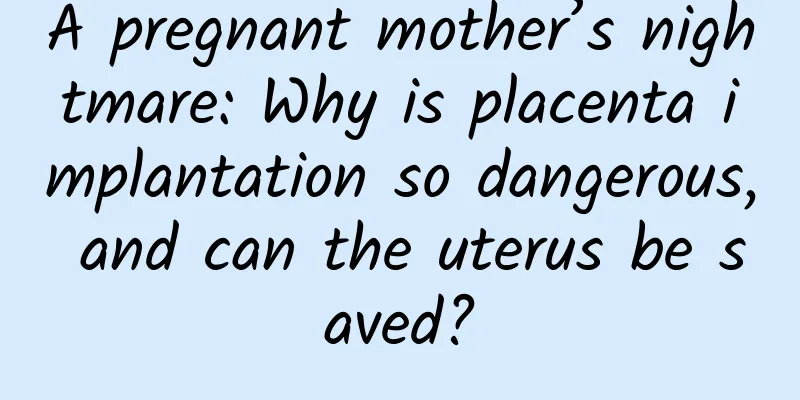A pregnant mother’s nightmare: Why is placenta implantation so dangerous, and can the uterus be saved?

|
Pregnancy and childbirth are supposed to be joyful events, but some pregnant women have to go through the gates of hell due to certain pregnancy complications. Among them is a type of pregnancy complication that may not only cause the loss of the uterus but may even endanger life. Ms. Huang, 36 years old, who lives in Tianyuan District, is a mother of two children. She had a cesarean section for her first child. Multiple color ultrasounds during pregnancy showed complete placenta previa. The placenta was located on the anterior and lower posterior walls of the uterus, completely covering the internal os of the cervix. Placental scoring showed a placenta score of 10 (severe placenta accreta), which puts the pregnant woman at great risk during pregnancy and delivery. Ms. Huang rushed to the obstetrics department of Hunan Provincial Hospital of Traditional Chinese Medicine for hospitalization at 36+ weeks of pregnancy. Director of the obstetrics department, Zhong Meiying, saw that the patient was depressed and anxious with tears in her eyes. After asking, she learned that the patient originally wanted to give birth in another hospital. Her family learned that the pregnant woman's situation was special, so for safety reasons, they quickly took her to the obstetrics department of Hunan Provincial Hospital of Traditional Chinese Medicine for hospitalization and delivery, which was experienced and technically sound. Severe placenta previa with placenta accreta is a major level 4 obstetric surgery that is difficult and risky. It may even cause severe bleeding and require hysterectomy, endangering the life of the pregnant woman. Under the leadership of Director Zhong Meiying, a full discussion was held before the operation. The Medical Department organized a hospital-wide consultation. A multidisciplinary team including obstetrics, gynecology, urology, blood transfusion, interventional, ultrasound, anesthesia, and intensive care unit (ICU) formed a high-quality medical team with superb skills and rich experience to make full preoperative preparations: various response measures such as intraoperative massive bleeding plan and postoperative management plan, and pre-operative interventional balloon occlusion pre-positioning by the interventional department. The operation was performed by Obstetrics Director Zhong Meiying, assisted by Chief Physician Li Xueping, Gynecology Director Zou Lisha, and Deputy Chief Physician Deng Yago . The operation went very smoothly, the uterus was successfully preserved, and the mother and baby were safe! Ms. Huang recovered very well after the operation. Ms. Huang and her family were very satisfied with it and especially thanked the obstetrics team of the hospital. 1. What is placenta accreta? The placenta is the tissue that transfers nutrients between the fetus and the mother. When the placenta is normal, the decidua basalis is only implanted into the endometrial layer. After the fetus is successfully delivered, the placenta will automatically peel off. However, when high-risk factors such as artificial abortion, induced labor, cesarean section, puerperal infection, placenta previa, and advanced age occur, the integrity of the endometrium is destroyed. Once the placenta is implanted into the myometrium, it is called placenta accreta. The placenta is like the roots of a big tree, intricately dispersed and deeply rooted in the myometrium of the uterus. During delivery, the implanted placenta cannot detach automatically, which may lead to massive bleeding, shock, uterine perforation, and even death. 2. Why does placenta accreta occur? Placenta accreta often occurs after traumatic or inflammatory damage or scar formation in the endometrium, so it is more common in women with a history of abortion, uterine curettage, cesarean section, manual placental removal, previous placenta accreta or placenta previa, endometritis, local mucosal atrophy of submucosal uterine fibroids, multiparas, primiparas with a gestational age of ≥35 years, etc. A history of cesarean section with placenta previa is the most important high-risk factor for placenta accreta. 3. What should I do if the placenta is implanted? Pregnant mothers who are diagnosed with placenta accreta should not be too nervous or anxious. After comprehensive evaluation to ensure the safety of mother and baby, they can look forward to treatment. They must go to a hospital capable of handling obstetric critical care for prenatal checkups and delivery, try to prolong the gestational age of the fetus, strengthen the management of high-risk pregnant women, and always be prepared to terminate the pregnancy. For patients with placenta accreta and placenta previa who are in stable condition, termination of pregnancy is recommended at 34-37 weeks of gestation. If the condition is severe or threatens the life of the mother or fetus, immediate termination of pregnancy should be considered regardless of the gestational age. To this end, the obstetrics team of Hunan Provincial Hospital of Traditional Chinese Medicine has been working hard to protect pregnant mothers, so that they can smoothly go through the pregnancy and delivery period and ensure the safety of mother and baby! Hunan Medical Chat Special Author: Deng Liling, Obstetrics Department, Hunan Provincial Hospital of Traditional Chinese Medicine Follow @湖南医聊 to get more health science information! (Edited by YT) |
>>: "Voice touches the heart"! Here is everything you want to know about ultrasound examination!
Recommend
Pictures of uterine prolapse
Uterine prolapse is a very common disease in wome...
What causes a lump in the chest? Common causes of chest lumps
Women must pay attention to lumps in their chests...
Two periods in one month? 6 reasons for frequent menstruation
1. Ovulation bleeding Ovulation bleeding usually ...
Why do my legs ache after sex?
The main reason women suffer from thigh muscle pa...
Is artificial abortion painful?
I believe everyone is familiar with artificial ab...
Brown discharge during early pregnancy
Pregnancy is an important period for women. Durin...
What to do if you have abdominal pain and bleeding during early pregnancy
The early stage of pregnancy is a particularly im...
Can I use ginger water to wash my vulva for itching nine days after medical abortion?
After medical abortion, if symptoms of itching ap...
The harm of not having menstruation for five months
Menstruation is something that women must go thro...
What are the anti-inflammatory drugs for gynecology?
The female vagina is a very sensitive and fragile...
What are the benefits and effects of Pu'er Ripe Tea? How long is the shelf life of Pu'er Tea?
Pu'er tea has an aged aroma, and the fatty ac...
How to make up to make your square face look smaller
A square face is like a big square face. If a wom...









